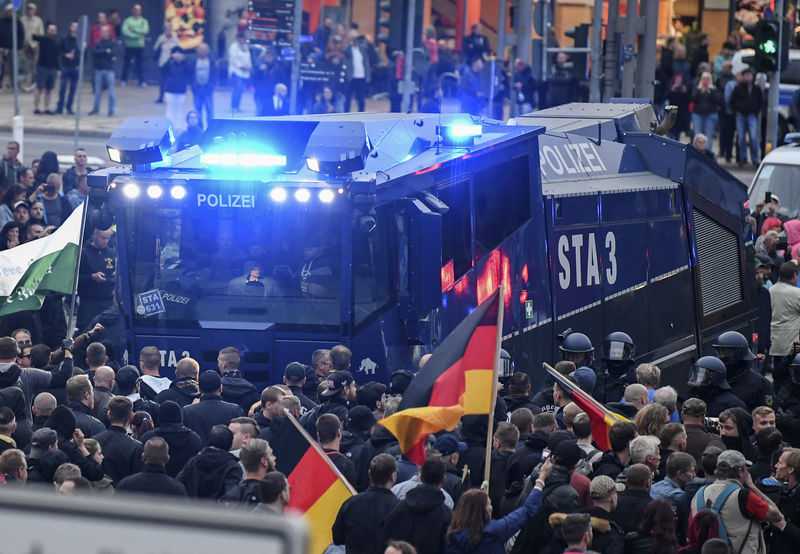German police shut down far-right protest early
03 September, 2018

Police in eastern Germany brought an early close Saturday to an anti-migrant march that far-right activists hoped would launch a nationwide movement to challenge the political establishment, with the fatal stabbing of a German citizen as the catalyst.
A trio of nationalist groups held separate rallies in the city of Chemnitz over the Aug. 26 slaying for which a Syrian and an Iraqi citizen were arrested. The two largest groups also organized their first joint march, a display of unity meant to build on other protests since the killing.
Saxony state police cited security concerns for halting the march after more than an hour, producing screams and whistles from demonstrators as officers moved in to clear the streets but no violence or vandalism as the crowd dispersed.
The progress of the far-right march had been interrupted several times before then as counterprotesters blocked the route and the sizeable police contingent on hand rushed to keep them and the marchers apart.
Saxony police estimated the event had 4,500 participants and 4,000 counterprotesters. If attendance is any gauge, the numbers revealed a movement in an early embryonic stage at best rather than approaching a mainstream arrival that could be hastened by well-timed pushes.
The emboldened far-right activists had reason to be optimistic and local authorities to be worried after the opposing camps clashed in Chemnitz on Monday, the day after the 35-year-old German man’s death.
Scenes of vigilantes chasing foreigners in the city’s streets have shocked people in other parts of Germany since then.
Police, at times, were unable to control the earlier protests and clashes.
Leaders of the two groups that combined forces on Saturday night cultivated a different image for the “mourning march,” wearing dark suits and carrying white roses.
However, the mood at the event bringing together previously isolated clusters of nationalists — from lawmakers to Hitler-saluting skinheads — darkened as the sun set. People from both ends of the political spectrum could be seen drinking beer and shouting slurs at police.
The tension in the air reflected the polarization over Germany’s ongoing effort to come to terms with an influx of more than 1 million refugees and migrants seeking jobs since 2015.
The right blames Chancellor Angela Merkel’s decision to allow in hundreds of thousands of asylum seekers from war-torn countries like Syria, Iraq and Afghanistan for multiple problems. Some far-right supporters argued before the killing in Chemnitz that migrants are responsible for an increase in serious crimes, especially attacks on women.
The anti-migrant sentiment has been particularly strong in Saxony state, traditional strongholds of groups that sought to inspire a nationwide movement on Saturday night: the Patriotic Europeans Against the Islamization of the West — or PEGIDA — and the far-right Alternative for Germany party, which has won seats in federal and state parliaments with an anti-Muslim platform.
While the share of foreigners residing in Saxony remains below Germany’s national average and displays of Nazi symbols are outlawed across the shame-marked country, far-right sympathizers mobilized with exceptional speed on the night of the Chemnitz slaying and the days after.
German Justice Minister Katarina Barley said Saturday that authorities should investigate the role of networks from the radical far right in spearheading the week’s protests.
“We do not tolerate that right-wing extremists infiltrate our society,” Barley told weekly newspaper Bild am Sonntag. “It’s about finding out who’s behind the mobilization of far-right criminals.”
TAG(s):
